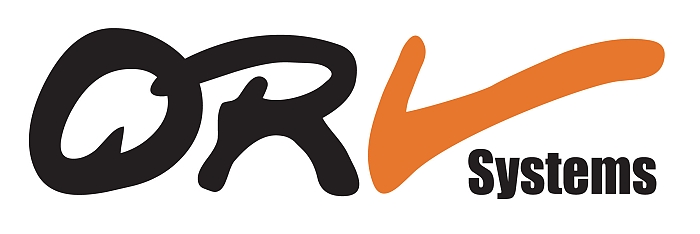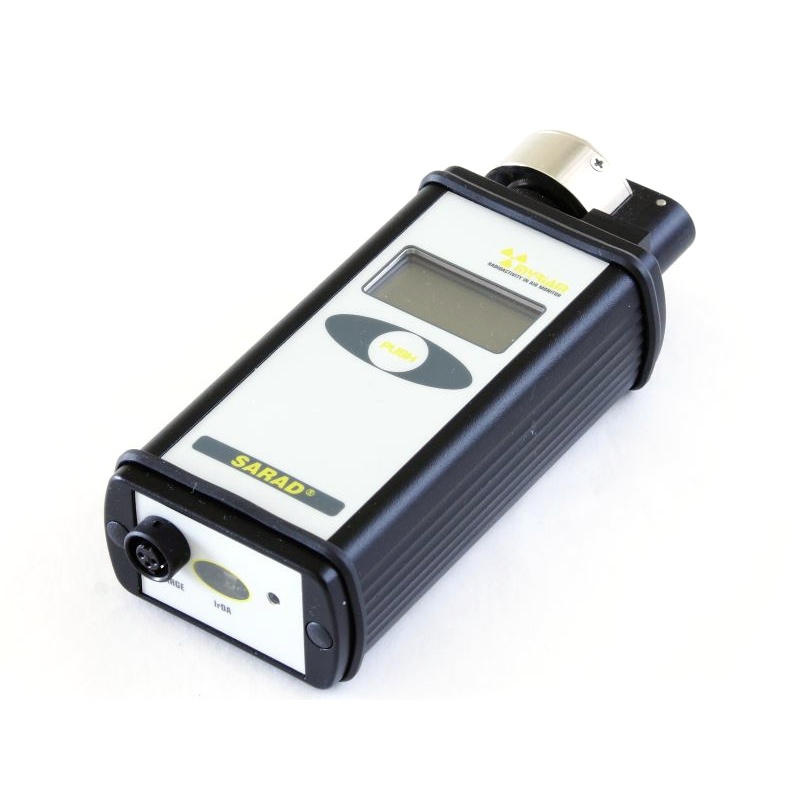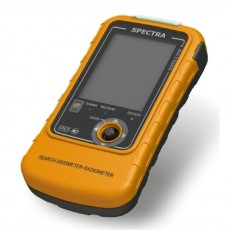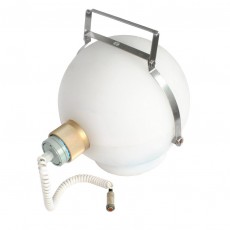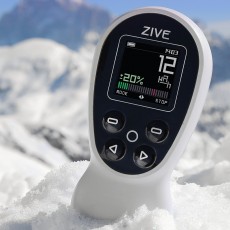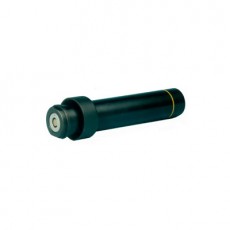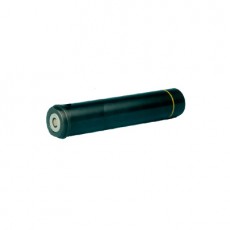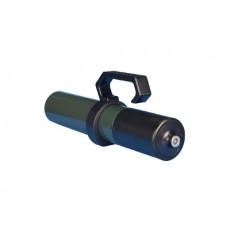An accurate determination of the obtained dose without any additional equipment is possible by a special filter analysis mode. The small filter paper (17,5 mm diameter) can be archived and used for preservation of evidence.
The lightweight (300g) instrument can be worn on the body without impairment of the mobility. Sampling head, battery and electronics have been integrated into a rugged metal enclosure of the size of a mobile phone. Therefore, no additional cables and hoses are required
Dangerous doses will be detected within 60 Seconds and signalised by an acoustical and an optical alert. The display, equipped with a with bright back-light shows the recent dose values (μSv or mrem) as well as the over all count rates. The internal rechargeable battery allows approx.24 hours of autonomous operation – it takes only one hour to recharge the battery.
No other maintenance is required than the battery recharging and a monthly and easy to perform filter replacement. The internal data logger enables a chronological (local) assignment of the obtained dose contributions.The communication between PC and MyRIAM is realised by a infrared data link.
Technical Data
Power Supply
- Internal batteries for approx. 24 hours operation,
- recharge time approx. 1 hour
Operation
- 1 Button (with lock function)
- Display (3 x 12 characters) with back-light
Alarm function
- optical (red bright LED at the top of the detector head)
- acoustical (sounder 85 dB at 2,3 kHz)
Dimensions/Weight
138 mm x 57 mm x 32 mm / 300g
Interface
Infrared (reader unit for PC, connection via USB)
Memory
240 Data records and Alpha spectrum
Integration Interval
1 … 255 Minutes (one Minute steps)
Detector
150 mm² ion-implanted silicon detector
Pump
0.25 L/min membrane type
Filter
0.8 µm PTFE, operable > 1 Month at „normal“ dust exposure
Alpha Spectroscopy
2.8 … 10 MeV
Energy Window for LLRD Alpha radiation
2.8 … 5.5 MeV
Lower Beta Cut Off
200 keV
Maximum count rate
100 000 counts per Minute
Detection Limits/Thresholds
refer following text
Software
Instrument set-up, data download, graphic display of acquired data (exposure, dose, concentration), ASCII Export (EXCEL compatible text file)
Detection thresholds and detection limits
The stated detection thresholds and detection limits are based on exposures meaning the
product of activity concentration an exposure times. All values are related to a confidence
interval of 3σ.
For the correction of the Radon daughters an Equilibrium Factor F of 1.0 is assumed which is
the worst case condition.
The limits are given for the most radio-toxic nuclides Pu-239 and Sr-90 (without Y-90). The
dose coefficients (e50) of those nuclides are derived from the ICRP68 standard for inhalation
(4,7E-5 Sv/Bq (Pu-239) and 1,5E-7 Sv/Bq (Sr-90)).
We assume the breathing rate for adults defined by the EURATOM guidelines.
To calculate the detection limit/Threshold for other nuclides, following expression may be
used:
H = e(50) * Breathing Rate * Exposure.
Independent on the set integration interval, a one Minute basic interval is applied to analyse
the filter with respect to dangerous exposures:
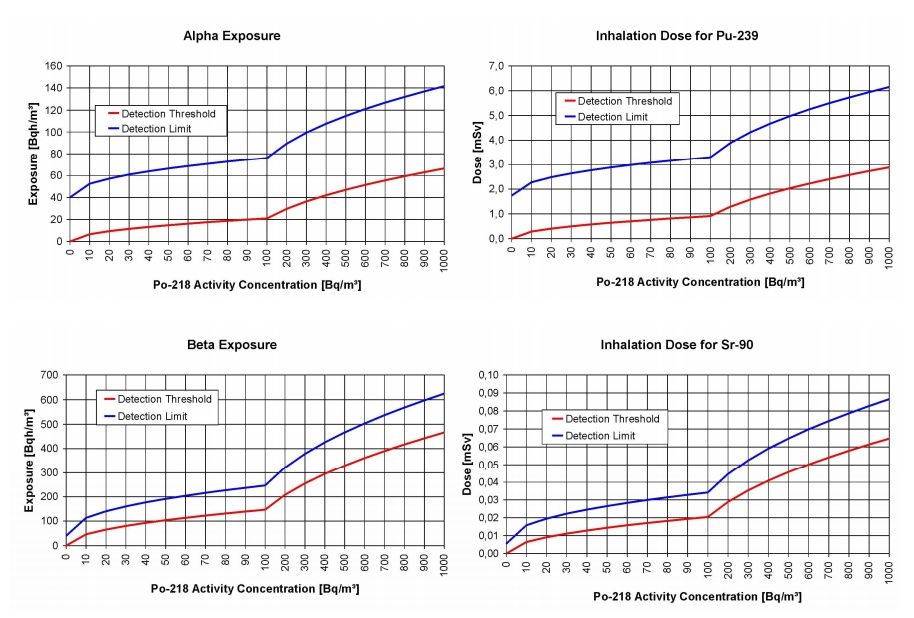
Choosing an integration interval of one hour causes strongly reduced detection limits and gives still a good possibility for a chronological (and therefor also local) assignment of dose contributions. The immediate alert function (1-Minute basic interval) is not affected by any setting of the integration interval. The resulting Limits for a 60 Minutes integration interval are stated below:
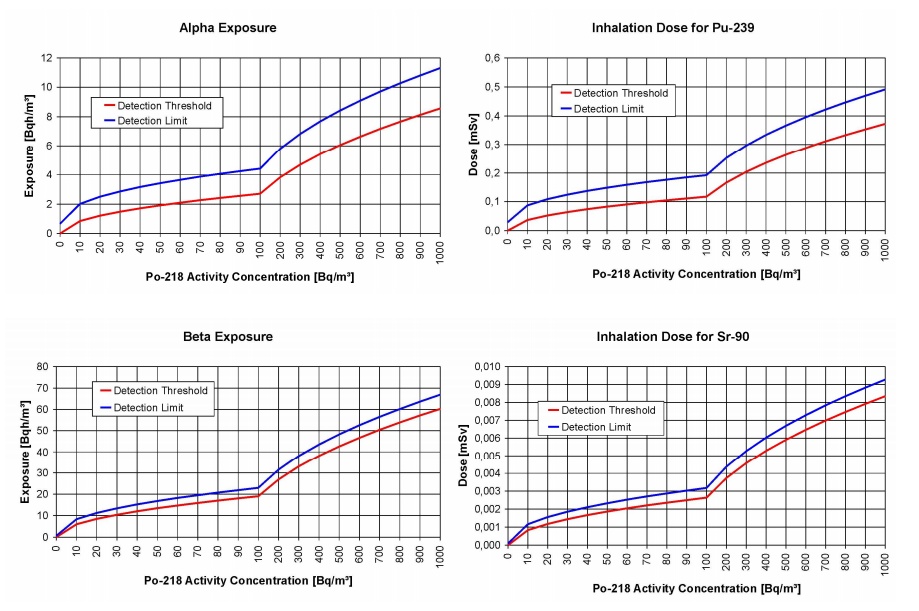
After finishing the observation period (e.g. one month), the inhalation dose for the whole period can be determined by using the filter analysis mode. Because the pump remains switched off, the influence of Radon daughters is negligible and the collected activity is stable over the analysis period.

